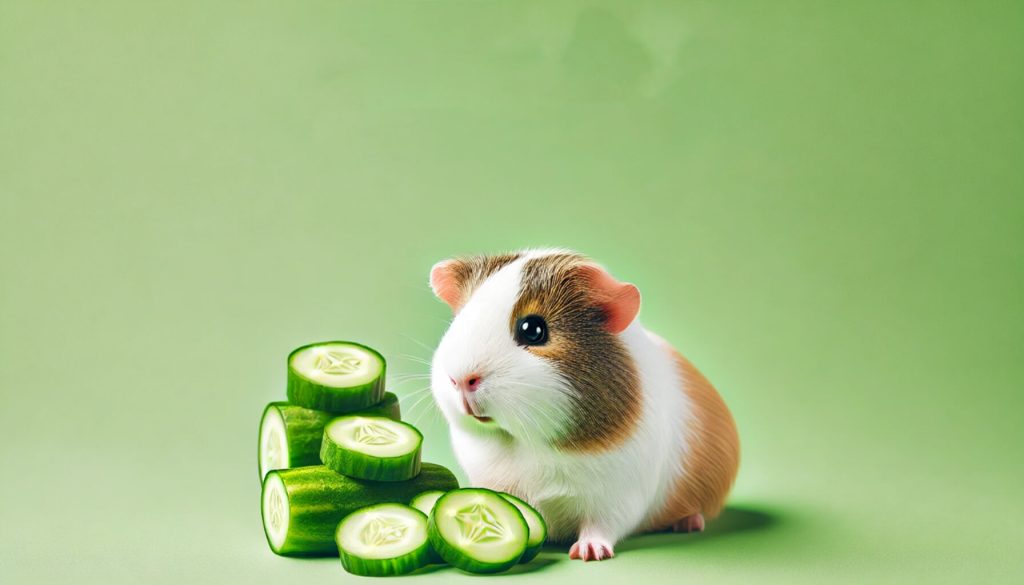
Can Guinea Pigs Eat Cucumber?
Health Benefits of Cucumbers for Guinea Pigs
Cucumbers make a crunchy, refreshing snack for guinea pigs. They offer several health benefits when given in moderation.
Hydration and Water Content
Cucumbers consist of about 96% water, making them an excellent hydration source for guinea pigs. Proper hydration supports overall health, including kidney and urinary tract function. Guinea pigs need fresh vegetables with high water content, like cucumbers, to prevent dehydration.
Vitamin and Mineral Boost
Cucumbers contain essential vitamins and minerals. These include vitamin K, which aids in blood clotting, and vitamin C, crucial for preventing scurvy in guinea pigs. Cucumbers also provide potassium, helping maintain proper cell function and heart health. Adding cucumber to your guinea pig’s diet offers a natural vitamin and mineral boost.
Potential Risks of Feeding Cucumber to Guinea Pigs
While cucumbers have benefits for guinea pigs, feeding them inaccurately poses potential risks.
Sugar Content Considerations
Cucumbers contain natural sugars. Though low, overfeeding raises blood sugar levels, contributing to obesity or diabetes. Always monitor portions, offering small slices only a few times a week. This keeps sugar intake manageable without overindulgence.
Digestive Health Concerns
High water content in cucumbers, if given excessively, leads to diarrhea and dehydration. Guinea pigs have sensitive digestive systems. Introduce cucumbers gradually, observing any adverse reactions such as loose stools. Balance cucumber treats with hay and other fibrous foods to maintain gut health. This ensures that your guinea pig enjoys cucumbers without digestive issues.
How to Properly Introduce Cucumber to Your Guinea Pig’s Diet
Introducing cucumbers to your guinea pig’s diet requires thoughtful consideration of portion size and preparation to ensure their health and well-being.
Portion Size and Frequency
Offer small cucumber slices no thicker than 1/8 inch. Limit the frequency to 2-3 times per week to prevent digestive issues. Guinea pigs have sensitive stomachs, and overconsumption can lead to diarrhea.
Preparation Tips
Rinse cucumbers under cold water to remove pesticides. Slice them thinly and avoid seeds, as they can cause choking. Serve raw cucumber at room temperature for optimal digestion and nutrient absorption. Observe your guinea pig after the first few servings to monitor for any adverse reactions, adjusting portions as necessary.
Alternatives to Cucumber in a Guinea Pig’s Diet
Offering a varied diet ensures your guinea pig gets a broad spectrum of nutrients while preventing boredom. Choosing the right fruits and vegetables are crucial.
- Bell Peppers: Rich in vitamin C, bell peppers support immune health. Offer red, yellow, or green varieties.
- Carrots: Carrots provide beta-carotene but serve them sparingly due to natural sugars.
- Spinach: Spinach contains iron and calcium, but high oxalate levels mean it should be fed in moderation.
- Broccoli: Broccoli offers vitamins C and K but can cause gas if given too much.
- Apples: Apples, with seeds removed, offer a sweet treat rich in fiber and vitamins A and C.
- Blueberries: These berries are antioxidant-rich and low in sugar, making them a good occasional treat.
- Celery: Celery provides fiber and vitamin K but cut it into small pieces to prevent choking.
- Tomatoes: Tomatoes are a source of vitamins A and C, but remove green parts and seeds to avoid toxins.
- Zucchini: This vegetable offers hydration with vitamins A and C, low in calories.
Ensure you introduce new foods gradually and monitor for any digestive issues. Always wash produce thoroughly to remove pesticides and serve in small, manageable pieces. A balanced diet helps maintain your guinea pig’s overall health.
Conclusion
Feeding cucumbers to your guinea pig can be a healthy addition to their diet when done correctly. They offer hydration and essential nutrients but must be given in moderation to avoid health issues like obesity and diarrhea. Always introduce new foods gradually and monitor your guinea pig for any adverse reactions. Remember to wash produce thoroughly and cut it into small pieces. By maintaining a balanced diet with a variety of fruits and vegetables, you can ensure your guinea pig stays happy and healthy.
